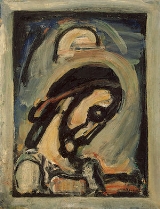
Georges Rouault
Georges Henri Rouault French Catholic painter associated with Fauvism and Expressionism. Rouault is regarded by many as the most important religious artist of the twentieth century.
Sourced
- I am a believer and a conformist. Anyone can revolt; it is more difficult silently to obey our own interior promptings, and to spend our lives finding sincere and fitting means of expression for our temperaments and our gifts — if we have any. I do not say "neither God, nor Master," only in the end to substitute myself for the God I have excommunicated..."
- Rouault, Georges. "Climat pictural." La Renaissance. XX, no. 10-12. (1937)
- Variant translation: Anybody can rebel. But to obey in silence, an inner calling to search lifelong without impatience for the means of expression adequate to us... that is much more difficult.
- Like the ostrich, head under wing
When the roaring storm breaks,
So many people take refuge
Under the soft pillow
Of specious arguments.- Le Cirque de l'étoile filante. (1938)
- A painter who loves his art must be careful not to see too much of critics and men of letters. These gentlemen, however unconsciously, distort everything, thinking that they are explaining it—the artist's thought, sensibility, and intensions. They take away his strength, just as Delilah took away Samson's. They have no gift for nuances, and they have an instinctive aversion for everything that is beyond their reach and baffles them.
- Soliloques. (1944)
- Nothing is old, nothing is new, save the light of grace underneath which beats a human heart. The way of feeling, of understanding, of loving; the way of seeing the country, the faces that your father saw, that your mother knew. The rest is chimerical..."
- Soliloques. (1944)
- Often pagans, with their eyes wide open, do not see very clearly.
- Quoted in Lionello Venturi, Rouault. New York. 19. (1947)
- The richness of the world, all artificial pleasures, have the taste of sickness and give off a smell of death in the face of certain spiritual possessions.
- Stella Vespertina. (1947)
- The artist discards all theories, both his own and those of others. He forgets everything when he is in front of his canvas.
- Stella Vespertina. (1947)
- The conscience of an artist worthy of the name is like an incurable disease which causes him endless torment but occasionally fills him with silent joy...
- Stella Vespertina. (1947)
- The painter who loves his art is ruler in his own kingdom, even if he be in Lilliput and a Lilliputian himself. He transforms a kitchen maid in to a fairy, and a great lady into a brothel matron, if he wants to and sees them so, for he is a seer. His vision includes everything that is alive in the past.
- Stella Vespertina. (1947)
- The old masters are perfect and admirable examples, on condition that we remember that the spirit gives life and the letter kills, and that even the best pastiche is inferior to the harmonious stammering or incoherence of a child trying to speak.
- Stella Vespertina. (1947)
Unsourced
- If there had been church windows as in the Middle Ages, I might not have become a painter.
